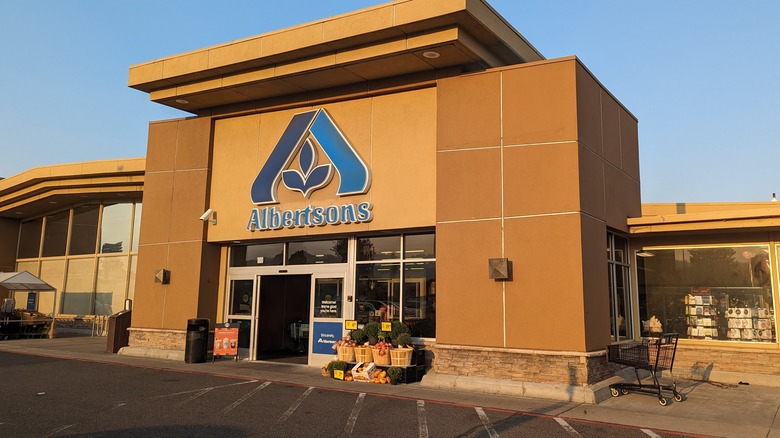Which Grocery Stores Are Owned By Kroger?
Kroger is one of America's most popular chain grocery stores, but most people don't know much beyond that. Outside of the main Kroger markets, this retailer is actually a huge corporation that owns several other grocery stores, some of which may surprise you.
While supermarkets are different than grocery stores, Kroger dominates grocery retail as a whole, owning Owen's, Jay C, Pay Less, Marianos, Pick 'n Save, Metro Market, Dillions Baker's, and Gerbe's in the Midwest. In the Rocky Mountains, it controls King Soopers and City Market. Ralphs, Smith's, and Fry's are under the Kroger umbrella in the Southwest, as is QFC and Fred Meyer in the Northwest. On the East Coast, Harris Teeter is also owned by Kroger. Alongside these supermarkets, Kroger also handles grocery warehouses Foods Co. in California and Food 4 Less in the Midwest and Southwest.
Mergers have played a massive role in Kroger's acquisition of many of stores. One of the most significant was Kroger's merger with Dillon Companies in 1983, which also brought Gerbes, City Market, King Soopers, and Fry's into the fold. The company also merged with Fred Meyer, Owens, Payless, and Jay C in 1999. Entering the 2000s, Baker's, Harris Teeter, Pick 'n Save, Marianos, and Metro Market were also scooped up. While all of this has been a boon for Kroger, not everyone is happy with how many stores have come under its control. The controversy is particularly evident in light of a $25 billion merger proposal between Kroger and Albertsons which was shut down by the latter in late 2024.
Kroger's merger proposal launched a court battle
In 2022, Kroger announced plans for the largest grocery store merger in U.S. history. For $24.6 billion, Kroger intended to buy Albertsons, stating that it would help the retailers compete against Walmart and negotiate with suppliers for better pricing. But regulators with the FTC moved to block the merger, claiming it would remove competition which could have meant higher prices for shoppers and lower pay for employees. But was there any truth to the claims?
Well, according to NerdWallet, the biggest issue the FTC had with the merger was the apparent forming of a monopoly. If all goods were being sold by a single company, less outside competition could result in fewer choices for consumers. Kroger's merger proposal appeared to step over the line when it came to antitrust legislation that was specifically designed to prevent mergers from harming competition.
In an effort to sweeten the deal (and eliminate the appearance of a monopoly), Kroger planned to sell over 500 stores to the owners of Piggly Wiggly, C&S Wholesale Grocers. That included several Safeway, Albertsons, and Jewel-Osco locations — which Albertsons owned — as well as many Mariano's locations. But negotiations dissolved after a judge blocked the merger in late 2024. With both grocery titans blaming the other for breach of contract, while facing scrutiny from the FTC and labor unions, it appears Kroger is relatively unaffected by the scrapped plans. As Kroger President and CEO Rodney McMullen explained during a call with investors (via Grocery Dive), "We've always made sure that we don't need to do mergers to make our business successful. ... We'll continue to go on."

